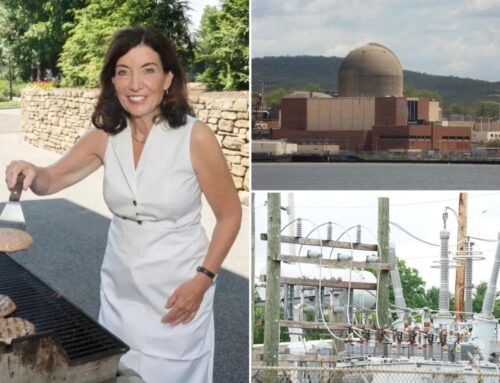Trump moves goalposts for farmers counting on clean energy grants
March 31, 2025
Hinson’s office did not respond to multiple requests for comment on the matter.
The No. 2 spot for REAP grants: Minnesota’s 1st Congressional District, represented by U.S. Rep. Brad Finstad. In that district, which spans southern Minnesota, more than 260 farmers and rural businesses were approved for REAP grants.
Finstad’s office did not return multiple emails and calls requesting comment. His constituents have been complaining about his silence on funding freezes. They’ve staged at least two demonstrations at his offices in Minnesota. Finstad said he held a Feb. 26 telephone town hall joined by 3,000 people in his district.
In a Feb. 28 letter to a constituent, Finstad said Rollins has announced that the USDA will honor contracts already signed with farmers and that he looks forward to working with the administration “to support the needs of farm country.”
Finstad is no stranger to the REAP program. Before becoming a congressman, he was the USDA’s state director of rural development for Minnesota. In that role, he was a renewable booster.
“By reducing energy costs, renewable energy helps to create opportunities for improvement elsewhere, like creating jobs,” Finstad said in a 2021 USDA press release. That has since been deleted from the agency’s website.
Rollins, meanwhile, called herself “a massive defender of fossil fuels” at her confirmation hearing, and she has expressed skepticism about the findings of climate scientists. “We know the research of CO2 being a pollutant is just not valid,” Rollins said at the Heartland Institute’s 2018 conference on energy.
She has also said that she welcomes the efforts of Elon Musk and his cost-cutting Department of Government Efficiency team at the USDA.
Losing trust in government
Jake Rabe, a solar installer in Blairstown, Iowa, said he has put up more than 100,000 solar modules in the state since getting into the business in 2015. More than 30 of his customers have completed their installation but are awaiting frozen grant funding, he said. At least 10 more have signed the paperwork but are hesitant to begin construction. Millions of dollars worth of business is frozen, he said.
On top of that, Rabe said, the state’s net metering policies — in which solar users get credits for any excess power they send back to the grid — are set to expire in 2026.
“I kind of feel like it may be the beginning of the end for the solar industry in Iowa with what’s going on,” said Rabe, who owns Rabe Hardware.
Despite it all, he remains a Trump supporter.
“Under the current administration, I think we’re doing things that are necessary for the betterment of the entire United States,” he said.
On March 13, Earthjustice, a nonprofit environmental law group, filed a federal lawsuit against the USDA on behalf of five farmers and three nonprofits. They’re seeking a court order to compel the Trump administration to honor the government’s grant commitments, saying it violated the Constitution by refusing to disburse funds allocated by Congress.
Vizcarra, the Earthjustice lawyer, said she is disturbed by the lack of concern from Congress, whose powers appear to have been usurped by the administration.
She added, “These are real people, real farmers, and real organizations whose projects have impacts on communities who are left with this horrible situation with no idea of when it will end.”
One of the plaintiffs, Laura Beth Resnick, grows dahlias, zinnias, and other cut flowers on a small farm about 30 miles north of Baltimore.
Florists are her customers, and demand for her flowers blooms during cold-weather holidays like Thanksgiving. Each of her three greenhouses is half the length of a football field, and heating them during those months isn’t cheap, Resnick said. The power bill for Butterbee Farm often exceeds $500 a month.
So a year ago, Resnick applied for a USDA renewable energy grant, hoping to put solar panels on her barn roof — a move that she estimated would save about $5,000 a year. In August, the USDA sent word that her farm had been awarded a grant for $36,450.
The cost of installing solar panels was $72,000, she said. So she paid a solar contractor $36,000 upfront, expecting that she’d pay the rest in January when the federal grant money came in. The solar panels were installed in December.
But the federal government’s check never arrived. A Feb. 4 email from a USDA representative said her request for reimbursement was rejected due to the Trump administration’s recent executive orders.
Resnick said she sought help from her elected representatives but got “pretty much nowhere.”
After hearing about the USDA’s announcement last week, Resnick said that based on the response she’s previously gotten from the USDA, she’s not confident she will get her grant money.
“I’ve lost my trust in the USDA at this point,” she said. “Our project is complete, so we can’t change the scope of it.”
Van Hollen, the Maryland Democrat, said he supports the legal fight against the funding freeze.
“Donald Trump and Elon Musk are scamming our farmers,” Van Hollen said in a statement to Floodlight. “By illegally withholding these reimbursements for work done under federal grants, they’re breaking a promise to farmers and small businesses in Maryland and across the country.”
Renewable projects on hold
Since 2023, when IRA funding became available, the USDA has given or loaned about $21.3 billion through programs to support renewable energy in rural areas, according to a Floodlight analysis of agency data, including the REAP program.
Those grant payments were processed until Jan. 20, when the Trump administration announced its freeze.
Trump’s decision was in line with Project 2025, a conservative blueprint crafted by the Heritage Foundation aimed at reshaping the U.S. government. That document called for repealing the IRA and rescinding “all funds not already spent by these programs.”
Environmental groups have sharply criticized the administration’s move, and several lawsuits are challenging the legality of the freeze of IRA funding.
At a recent public roundtable, Maggie Bruns, CEO of the Prairie Rivers Network, which supports Illinois communities’ transition to clean energy, listed REAP grants that have been held up in Illinois, where her multifaceted environmental nonprofit is based. A $390,000 grant for a solar array at the grocery store in Carlinville; $27,000 for solar panels at an auto body shop in Staunton; $51,000 for a solar array for a golf course in Alton.
Since 2023, farmers and businesses in Illinois have been approved for more than 590 REAP grants, making the state the third highest in number of recipients in the United States, Floodlight’s analysis shows. In an interview with Barn Raiser, Bruns said the decision to freeze such grants has caused unneeded stress for farmers. Before the executive order, USDA’s rural development team had worked hard to bring dollars for renewable energy projects to Illinois farmers, she said.
“That’s the thing we should be celebrating right now,” Bruns said, “and instead we have to fight to make sure that money actually does land into the pockets of the people who have gone ahead, jumped through all these hoops and are attempting to do the right thing for their businesses and their farms.”
In January, Dan Batson’s nursery in Mississippi was approved for a $400,367 REAP grant — money that he planned to use to install four solar arrays. He intended to use that solar energy to power the pumps that irrigate more than 1 million trees, a move that would have saved the company about $25,000 a year in electricity costs.
Seated in a wooded area about 30 miles north of Biloxi, his 42-year-old GreenForest nursery ships potted magnolias, hollies, crepe myrtles, and other trees to Southern states. Until a couple of months ago, Batson had been excited about what the grant money would mean for the business.
But when he saw news about the funding being held up earlier this year, he called a local USDA representative who confirmed the funds had been frozen. Batson had already sent the solar contractor $240,000. Now, his plans are on hold.
“I just can’t do the project if I don’t get the money,” he said.
Last week’s announcement from the USDA makes him no more confident he’ll get the money, he said.
Batson said he’s a fiscal conservative, so he understands the effort to cut costs. “But,” he said, “the way they’ve gone about it has disrupted a lot of business owners’ lives.”
Floodlight is a nonprofit newsroom that investigates the powers stalling climate action. Barn Raiser is a nonprofit newsroom covering rural and small town America.
Search
RECENT PRESS RELEASES
Related Post




